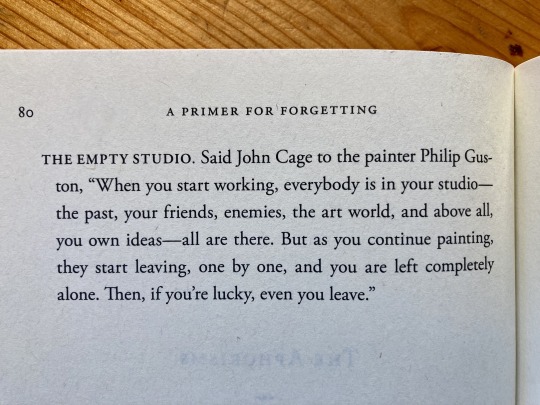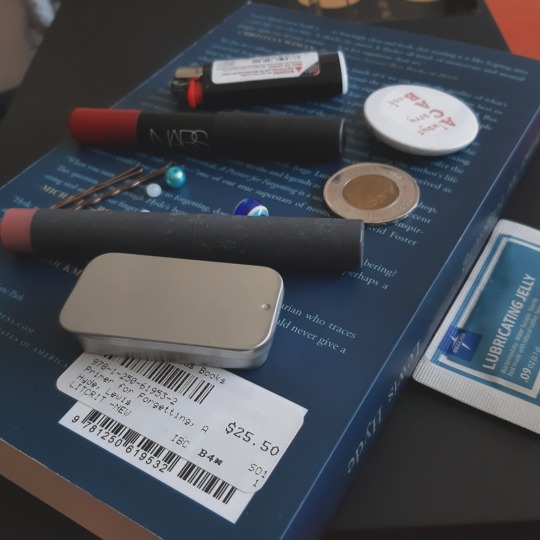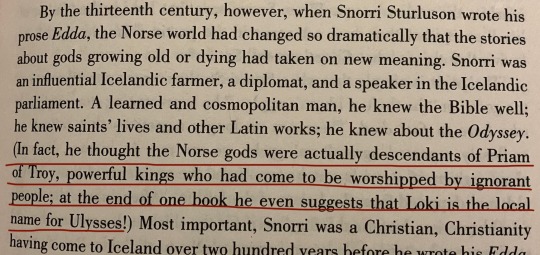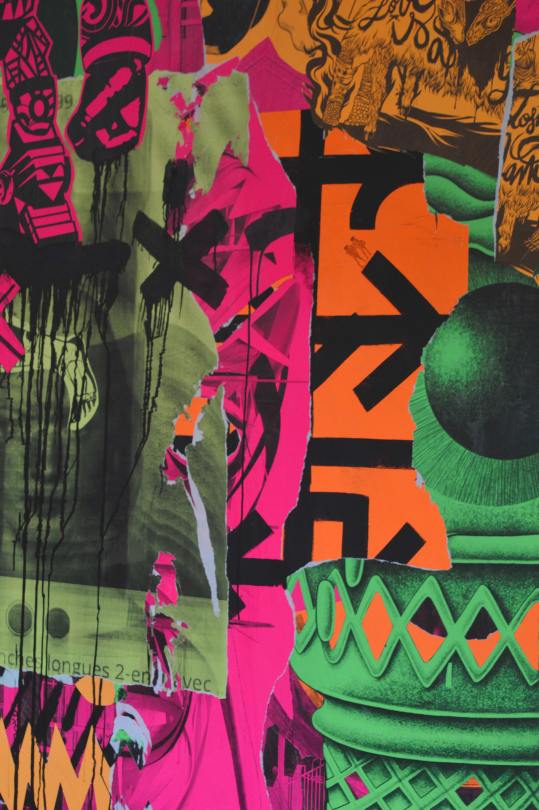#Lewis Hyde
Text

#lewis hyde#a primer for forgetting#reading#john cage#creative practice#solitude#buddhism#composition
68 notes
·
View notes
Text
I’m filled with a strange unspecific desire. I want everything and nothing.
In the furniture stores we visit, I’m filled with a strange unspecific desire. I want everything and nothing. The soft colors of the rugs, the warm wood grains, the brass and glass of the lamps all seem to suggest that the stores are filled with beautiful things, but when I look at any one thing I don’t find it beautiful. “The desire to consume is a kind of lust,” Lewis Hyde writes. “But consumer goods merely bait this lust, they do not satisfy it. The consumer of commodities is invited to a meal without passion, a consumption that leads to neither satiation nor fire.”
— Eula Biss, Having and Being Had (Riverhead Books, September 1, 2020)
12 notes
·
View notes
Text
The best way to describe the trickster is to say simply that the boundary is where he will be found — sometimes drawing the line, sometimes crossing it, sometimes erasing it or moving it, but always there, the god of the threshold in all its forms.
— Lewis Hyde, Trickster Makes This World
17 notes
·
View notes
Text

From my mother's photos. Her childhood gang. Photo taken by her father.
* * * * *
Pablo Neruda's Greatest Lesson from Childhood
by Lewis Hyde
Playing in the lot behind the house one day when he was still a little boy, Neruda discovered a hole in a fence board. "I looked through the hole and saw a landscape like that behind our house, uncared for, and wild. I moved back a few steps, because I sensed vaguely that something was about to happen. All of a sudden a hand appeared---a tiny hand of a boy about my own age. By the time I came close again, the hand was gone, and in its place there was a marvellous white toy sheep.
"The sheep's wool was faded. Its wheels had escaped. All of this only made it more authentic. I had never seen such a wonderful sheep. I looked back through the hole but the boy had disappeared. I went in the house and brought out a measure of my own: a pine cone, opened, full of odor and resin, which I adored. I set it down in the same spot and went off with the sheep.
"I never saw either the hand or the boy again. And I have never seen a sheep like that either. The toy I lost finally in a fire. But even now...whenever I pass a toyshop, I look furtively into the window. It's no use. They don't make sheep like that anymore."
Neruda has commented on this incident several times. "This exchange of gifts---mysterious---settled deep inside me like a sedimentary deposit," he once remarked in an interview. And he associates the exchange with his poetry. "I have been a lucky man. To feel the intimacy of brothers is a marvellous thing in life. To feel the love of people whom we love is a fire that feeds our life. But to feel the affection that come from those whom we do not know, from those unknown to us, who are watching over our sleep and solitude, over our dangers and our weaknesses---that is something still greater and more beautiful because it widens out the boundaries of our being, and unites all living things.
"That exchange brought home to me for the first time a precious idea: that all humanity is somehow together...It won't surprise you then that I have attempted to give something resiny, earthlike, and fragrant in exchange for human brotherhood...
"This is the great lesson I learned in my childhood, in the backyard of a lonely house. Maybe it was nothing but a game two boys played who didn't know each other and wanted to pass to the other some good things of life. Yet maybe this small and mysterious exchange of gifts remained inside me also, deep and indestructible, giving my poetry light."
(From 'The Gift: Creativity and the Artist in the Modern World', Lewis Hyde)
#Lewis Hyde#quotes#The Gift#The Gift: Creativity and the Artist in the Modern World#childhood#Ruth's album on flickr#Ruth#mother#C.C. Ben
12 notes
·
View notes
Text

"If you can master nonsense as well as you have already learned to master sense, then each will expose the other for what it is: absurdity. From that moment of illumination, a man begins to be free regardless of his surroundings.
He becomes free to play order games and change them at will. He becomes free to play disorder games just for the hell of it. He becomes free to play neither or both. And as the master of his own games, he plays without fear, and therefore without frustration, and therefore with good will in his soul and love in his being.”
- Malaclypse the Younger, Principia Discordia
#trickster#the fool#the jester#rascal#discordians#discordianism#hail eris#ifyoucanreadthisyoureapope#if you can read this youre a pope#Malaclypse the Younger#kerry Thornley#greg hill#lewis hyde#archetype#wise fool
46 notes
·
View notes
Text

v non-curated what's in my bag post because i'm washing my tote
#pill box contains lactase pills and the cosmetics are sephora birthday samples from 3+ years ago#i might buy new ones now that i'm not so broke#mine#what's in my bag#a primer for forgetting#lewis hyde
4 notes
·
View notes
Text

4 notes
·
View notes
Text
The Gift: How the Creative Spirit Transforms the World
by Lewis Hyde
Introduction | pdf
Forward by Margaret Atwood | pdf
The Gift is a brilliant, life-changing defense of the value of creative labor. Drawing on examples from folklore and literature, history and tribal customs, economics and modern copyright law, Lewis Hyde demonstrates how our society—governed by the marketplace—is poorly equipped to determine the worth of artists' work.
Short Review: "Life changer. Must read."
— embyr, sobbing into her pillow, probably.
Long Review: This is a book I put off reading for too long, and it shows. The Gift begins with the basic premise that art is a gift, not a commodity. But, as we live in a society dominated by the market economy, there are constant attempts to commoditize art. As it turns out, though, the closer art pushes toward a commodity, the less of a gift it becomes, until it isn't recognizable as art at all. Thus, artists of all sorts are caught in this awkward push and pull between that deep reach into the soul from which they might pull out handfuls of words or colors—that unknowable bestowal of inspiration from some otherworldly place—that is the creative process, and the basic need to eat.
Even for those of us who have never thought of trying to make a living off our art, there is a tendency to view our creations as commodities if we aren't remarkably careful, and measure their value as we would marketplace commodities: in likes, reblogs, kudos, followers, and so on, as though they were dollars and cents and sales figures. But, as The Gift makes abundantly clear, works of art are gifts that can't be measured in such pedestrian currencies:
"Even if we have paid a fee at the door of the museum or concert hall, when we are touched by a work of art something comes to us which has nothing to do with the price... When we are moved by art we are grateful that the artist lived, grateful that he labored in the service of his gifts."
All of this is covered in much more elegant detail in the book's introduction, linked above.
The Gift proceeds to tackle this predicament in two distinct sections, the first half a series of ethnography, folklore, and anecdotes that examine the nature of a gift and gift exchange (and thus, the creative spirit), and the second half a study of the work and lives of two poets, Walt Whitman and Ezra Pound.
I will add one caveat here, which is that the book is extremely long-winded. Not a chapter went by where I didn't feel sure, somewhere abouts halfway through, that I was being led down an incredibly deep rabbit hole of anthropological tangent or medieval tax law history that was bound to have no point and no relationship to art or the plight of the artist at all. Somehow it always came back around, shocking and illuminating as a bolt of lightning (though, to cite just one example, sometimes didn't have its resolution until some 60 pages later). That having been said, though I feel very deeply that everything The Gift has to say could have been said in half as many words, I'm not sure which passages I would cut. Perhaps being mired in it for nearly 400 pages is part of the process.
And by process, I'm referring to the changes I underwent personally (but that I suspect aren't unique). My view towards art and its inherent worth—my own art, yours, everybody's—has fundamentally shifted. And it seems to me that that's what the book is about: not about telling anyone how they ought to make their art or how to navigate making a living by their art, but about reeducating ourselves and reshaping our attitudes about the nature of the gift, gift exchange, and the creative spirit. It's a genuine, inward-looking, healing experience. And it equips you to create, undisturbed and unobstructed, for as long as you have the gift in you: "The gift we long for, the gift that, when it comes, speaks commandingly to the soul and irresistibly moves us."
"If you want to write, paint, sing, compose, act, or make films," Margaret Atwood says in her foreword, "read The Gift. It will help to keep you sane."
#The Gift#How the Creative Spirit Transforms the World#Lewis Hyde#book review!#art#artists#writing#writers#not Zelda
19 notes
·
View notes
Text

“Most artists are brought to their vocation when their own nascent gifts are awakened by the work of a master. That is to say, most artists are converted to art by art itself. Finding one's voice isn't just an emptying and purifying oneself of the words of others but an adopting and embracing of filiations, communities, and discourses. Inspiration could be called inhaling the memory of an act never experienced. Invention, it must be humbly admitted, does not consist in creating out of void but out of chaos. Any artist knows these truths, no matter how deeply he or she submerges that knowing.”
― Lewis Hyde, The Gift
Photo by Marius Girard on Unsplash
7 notes
·
View notes
Text

The way how good media is giving me a newfound appreciation for this book, I often find book that are way beyond me and ahead of schedule and read them a year later to truly appreciate and understand why I was drawn to them ♥️
#trickster makes the world#Lewis Hyde#literature#lit analysis#tricksters#ethos and methodology#the way I watched amc iwtv at the right time
2 notes
·
View notes
Text
'' When the Puritans first landed in Massachusetts, they discovered a thing so curious about the Indians’ feelings for property that they felt called upon to give it a name. In 1764, when Thomas Hutchinson wrote his history of the colony, the term was already an old saying: “An Indian gift,” he told his readers, “is a proverbial expression signifying a present for which an equivalent return is expected.” We still use this, of course, and in an even broader sense, calling that friend an Indian giver who is so uncivilized as to ask us to return a gift he has given.
…
…The opposite of “Indian giver” would be something like “white man keeper” (or maybe “capitalist”), that is, a person whose instinct is to remove property from circulation, to put it in a warehouse or museum (or, more to the point for capitalism, to lay it aside to be used for production).
The Indian giver (or the original one, at any rate) understood a cardinal property of the gift: whatever we have been given is supposed to be given away again, not kept. Or, if it is kept, something of similar value should move on in its stead, the way a billiard ball may stop when it sends another scurrying across the felt, its momentum transferred. You may keep your Christmas present, but it ceases to be a gift in the true sense unless you have given something else away. As it is passed along, the gift may be given back to the original donor, but this is not essential. In fact, it is better if the gift is not returned but is given instead to some new, third party. The only essential is this: the gift must always move. There are other forms of property that stand still, that mark a boundary or resist momentum, but the gift keeps going. ''
-Lewis Hyde, The Gift
0 notes
Text
“As the scholar and writer Lewis Hyde notes, it is the cardinal difference between gift and commodity exchange: that a gift establishes a feeling bond between two people…. Hyde reminds us that in a gift economy, one’s freely given gifts cannot be made into someone else’s capital.”
— Robin Wall Kimmerer, Braiding Sweetgrass
#braiding sweetgrass#robin wall kimmerer#Lewis Hyde#gifts#quote#forgive me for any misprints I’m listening to the audiobook
1 note
·
View note
Text
Will the Society of the 5th Cave Invoke the Mystery?
The book club to which I belong, “The Society of the 5th Cave,” is made up of members, all-be-it old educated professionals, males who pride themselves in being specialists in many areas, but with the age-accepting reality of being skilled in few. Mostly politically right of center seeking to help me see the light, convinced that those with opposing views are also conducting their act of…

View On WordPress
#book club#Douglas Rushoff#Duende#Federico Garcia Lorca#Labor#Lewis Hyde#Life Inc.#The Gift#The Society of the 5th Cave
0 notes
Photo

The Vital Difference Between Work and Labor: Lewis Hyde on Sustaining the Creative Spirit
"The gifts of the inner world must be accepted as gifts in the outer world if they are to retain their vitality."
https://www.themarginalian.org/2023/01/27/lewis-hyde-work-labor/
0 notes
Text
One of Picasso’s favorite assignments for a young artist was to have him or her try to draw a perfect circle. It can’t be done; everyone draws a circle with some particular distortion, and that distorted circle is “your” circle, an insight into “your” style. “Try to make the circle as best you can. And since nobody before you has made a perfect circle, you can be sure that your circle will be completely your own. Only then will you have a chance to be original.” The deviations from the idea give an insight into the style, and thus, Picasso says, from “errors” one gets to know the personality.
-Lewis Hyde, Trickster Makes This World: Mischief, Myth and Art
1 note
·
View note
